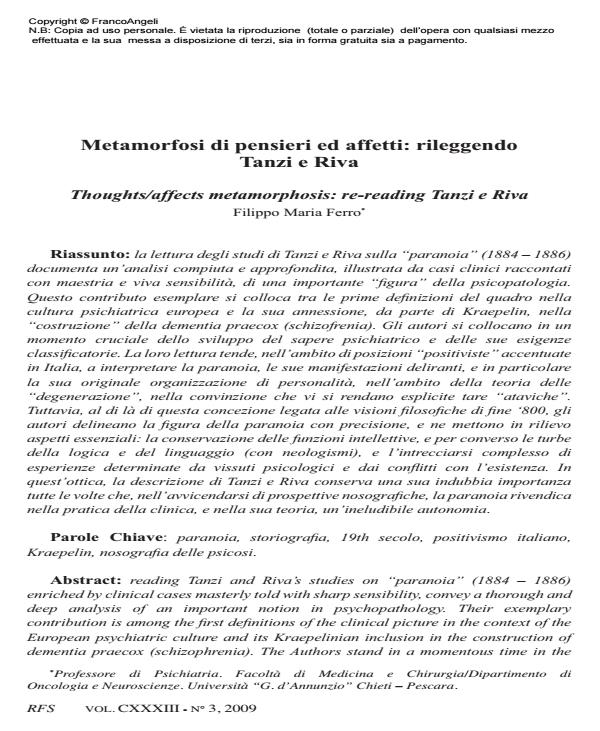Metamorfosi di pensieri ed affetti: rileggendo Tanzi e Riva
Journal title RIVISTA SPERIMENTALE DI FRENIATRIA
Author/s Filippo Maria Ferro
Publishing Year 2009 Issue 2009/3
Language Italian Pages 11 P. 97-110 File size 317 KB
DOI 10.3280/RSF2009003003
DOI is like a bar code for intellectual property: to have more infomation
click here
Below, you can see the article first page
If you want to buy this article in PDF format, you can do it, following the instructions to buy download credits

FrancoAngeli is member of Publishers International Linking Association, Inc (PILA), a not-for-profit association which run the CrossRef service enabling links to and from online scholarly content.
Metamorfosi di pensieri ed affetti: rileggendo Tanzi e Riva - reading Tanzi and Riva’s studies on "paranoia" (1884 - 1886) enriched by clinical cases masterly told with sharp sensibility, convey a thorough and deep analysis of an important notion in psychopathology. Their exemplary contribution is among the first definitions of the clinical picture in the context of the European psychiatric culture and its Kraepelinian inclusion in the construction of dementia praecox (schizophrenia). The Authors stand in a momentous time in the evolution of psychiatric knowledge and its needs for classifications. Their hypothesis, which follows "positivistic" ideas strong in Italy at the time, tends to interpret paranoia, its delusional expressions and, in particular, its peculiar personality organisation, in the context of the "degeneration" theory, in the belief that paranoia displays "atavistic" defects. Nevertheless, beyond this concept, linked to end of eighteenth century philosophical views, the Authors outline the subject of paranoia with precision, highlighting its essential features: the conservation of intellectual functions, despite the presence of disturbances affecting logic and language (with neologisms), and the complex interweaving of experiences caused by psychological events and existential confl icts. From this perspective, Tanzi and Riva’s description maintains an undisputable importance whenever, in the superseding of nosographic stances, paranoia calls for an irreducible autonomy both in clinical practice, both in its theory.
Keywords: Paranoia, eighteenth century, Italian positivism, Kraepelin, nosography of psychoses.
Filippo Maria Ferro, Metamorfosi di pensieri ed affetti: rileggendo Tanzi e Riva in "RIVISTA SPERIMENTALE DI FRENIATRIA" 3/2009, pp 97-110, DOI: 10.3280/RSF2009003003